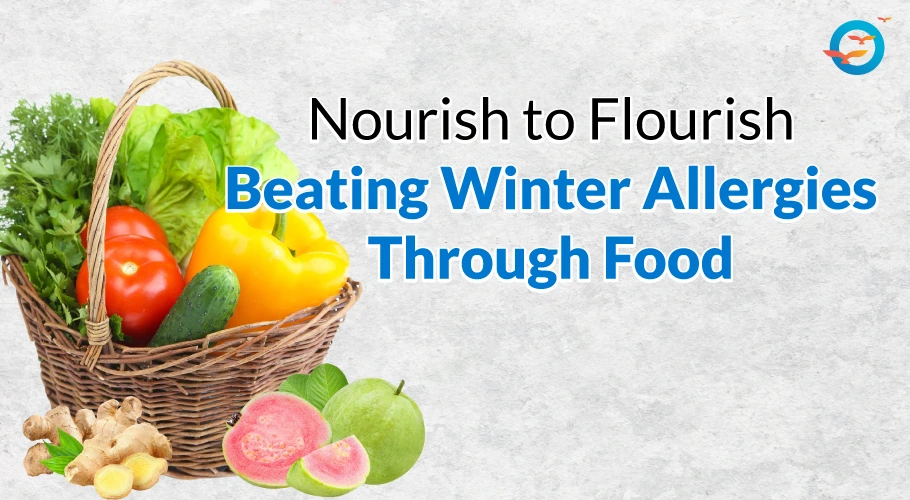Is it possible to beat winter allergies with your diet?

How to Beat Winter Allergies Naturally with Your Diet?
Winter is here, bringing with it cozy woolen blankets, mouthwatering delicacies, and a delightful seasonal vibe.
However, along with the charm of winter, allergies often make their way into our lives. These winter allergies are primarily triggered by indoor allergens, as we tend to spend more time indoors during the colder months.
Here are some dietary approaches (beat allergies naturally ) to help you combat winter allergies and enjoy the season to the fullest:
Beat Winter Allergies Naturally with Dietary Tips
Anti-Inflammatory Foods
Allergies cause inflammation, so incorporating anti-inflammatory foods can help reduce inflammation levels in the body. Include berries, citrus fruits, nuts, seeds, and green leafy vegetables in your meals. Don’t forget to add Indian spices like turmeric, cinnamon, and ginger, known for their powerful anti-inflammatory properties.
Vitamin C-Rich Foods
Vitamin C acts as a natural antihistamine, reducing allergic reactions. Seasonal options like citrus fruits, guava, and amla are easily available during winters and can work wonders. Other Vitamin C-rich foods include kiwi, berries, and bell peppers. Make sure to include these in your daily diet for optimal benefits.
Support Gut Health
A healthy gut is essential for a balanced immune response. Add probiotics like yogurt ( Vegan yogurt) or kefir (100-150 ml) to your meals to support gut health. You can also include fermented foods like sauerkraut or kimchi (one tablespoon or in moderate quantity) with your salads to further enhance immune function.
Avoid Trigger Foods
Certain foods like sugary treats, dairy, and processed grains can increase mucus production, worsening respiratory symptoms. Limiting or avoiding these foods during allergy season can significantly alleviate symptoms.
Sip on Herbal Teas
Herbal teas are a perfect winter companion. They are the best remedy for allergies. Peppermint tea helps relieve nasal congestion, while ginger tea reduces inflammation and soothes irritated respiratory passages. Tulsi and lemon grass tea can be included as it reduces phlegm and is also antibacterial.
Stay Hydrated
Hydration is key to keeping mucus thin and clearing allergens from the system. Opt for warm liquids like soups, broths, and herbal teas, which are both hydrating and comforting in colder weather. Prefer drinking lukewarm water throughout the day.
By following these dietary strategies, you can reduce allergy symptoms and enhance your immune system’s resilience during the winter season.
Stay allergy-free and savor the joys of winter!
You can read here Why Winter is the Best Season for Weight Loss?
FAQs About Winter Allergies and Diet
What are common winter allergies, and how can diet help manage them?
Common winter allergies include dust mites, mold, and pet dander. Including anti-inflammatory foods, Vitamin C-rich fruits, and probiotics in your diet can help reduce inflammation and allergic reactions.
Should I avoid dairy during winter if I have allergies?
Yes, it's advisable to limit dairy as it can increase mucus production and worsen respiratory symptoms.
How to get rid of winter allergies fast?
Stay hydrated, use a saline nasal spray, avoid allergens, and include anti-inflammatory foods like ginger and turmeric in your diet to alleviate symptoms quickly.
Can diet help with seasonal allergies?
Yes, a diet rich in anti-inflammatory and antihistamine foods like citrus fruits, green leafy vegetables, and probiotics can help manage seasonal allergies.
Are there any herbs or spices that can alleviate allergy symptoms naturally?
Yes, herbs and spices like turmeric, ginger, peppermint, and cinnamon have anti-inflammatory and soothing properties that can help reduce allergy symptoms.

